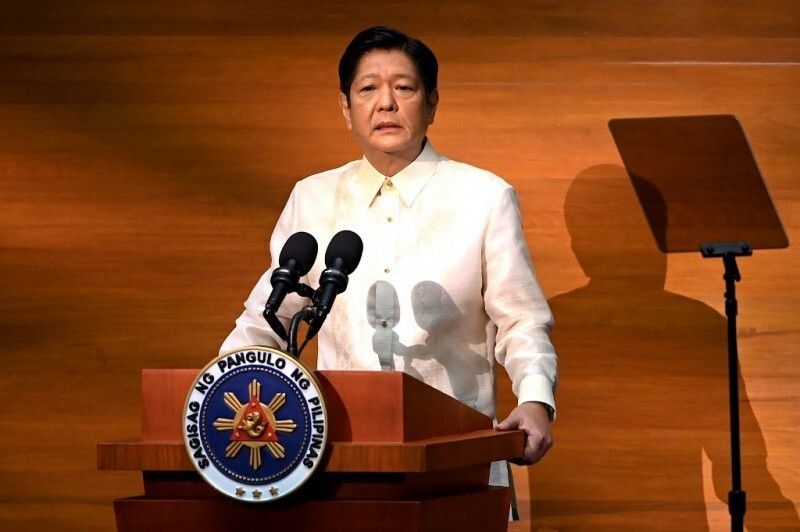Marcos' ideal education system: English-speaking students good at science and math

MANILA, Philippines — In his first State of the Nation Address, President Ferdinand Marcos Jr. described his plans for improving the education system, which revolved around reconsidering the use of English as the medium of instruction in schools and enhancing students’ performance in Science, Technology, Engineering and Mathematics (STEM).
“Foreign employers have always favored Filipino employees because of our command of the English language. This is an advantage that we must continue to enjoy,” Marcos said.
Also part of Marcos’ argument for using English to teach students is the internet – which he called “the global marketplace not only for goods and services, but also for ideas” – uses English.
“Therefore, the question of our medium of instruction must be continuously re-examined to maintain that advantage that we have established as an English-speaking people,” Marcos added.
Filipino advocacy group Tanggol Wika on June 21 opposed the president’s plan to use English as the primary medium of instruction in basic education, calling the policy “illogical.”
“Other than insufficient funds for public education, the government’s perennial obsession with the forced use of English in education is to blame for the current mess we are in,” the group said.
The K to 12 program includes the Mother Tongue-Based-Multilingual Education (MTB-MLE), where students are taught in their mother tongue for all subjects, except Filipino and English, from Kindergarten to Grade 3. English is used as the primary medium of instruction starting Grade 4.
In MTB-MLE, students grasp basic concepts and lessons in the language they understand best – their mother tongue – “and develop a strong foundation in their mother language before adding additional languages,” according to the Department of Education’s curriculum framework for MTB-MLE.
In a 2019 study, the state think tank Philippine Institute for Development Studies found that MTB-MLE’s implementation has largely been faulty. It pointed to problems such as linguistic diversity in the classroom with some students knowing more than one mother tongue, as well as procurement and funding issues of learning materials.
Science and math
Marcos also mentioned in his speech that the country must improve its international rankings in STEM subjects.
“These skills and this knowledge are necessary for our young people to be able to compete in a highly technological and competitive world,” Marcos added.
Among 79 participating countries, the Philippines scored the second lowest in math and science in the 2018 Programme for International Student Assessment (PISA), a study by the Organisation for Economic Co-operation and Development that assesses students’ knowledge in reading, mathematics, and science.
DepEd in 2019 said these results also reflected students’ poor performance in the National Achievement Test.
“The raw talent is there in our young people. It is up to our educational system to develop and to refine that great pool of talent,” Marcos added.
More Filipinos need to pursue a career in STEM, according to a 2020 study by state think tank Philippine Institute for Development Studies. Its projections estimate that by 2025, the country would be short of 13,964 workers in the life sciences, 569,903 in engineering, 9,689 in the physical sciences and 13,285 in math and statistics.
“The fact that the total S&T workforce constitutes only a small portion of the country’s workforce underscores the need for government support of most of S&T disciplines,” the study showed.
Educational materials, K to 12 program
Marcos said that "horror" stories in the poor quality of educational materials must also end.
But just like in his inaugural speech, he sidestepped concerns that his administration would revise the curriculum for history classes to erase the human rights violations abetted by his father’s dictatorial rule.
“Once again, I am not talking about history, or what is being taught. I am talking about materials that are necessary for effective teaching in this day and age,” Marcos added.
Marcos also mentioned having “lengthy discussions on the continuation and viability of the K to 12 school system.”
“We are giving this a careful review, and all necessary inputs and points of view are now being considered,” he said.
The Alliance of Concerned Teachers (ACT) Philippines urged Marcos earlier to include the “overhauling of the K to 12 curriculum” as part of his education agenda. Meanwhile, the Teachers' Dignity Coalition, another group of teachers, called to review the existing K to 12 program.
Republic Act No. 10533 or the K to 12 law states that the DepEd is required to conduct an “evaluation and review” of the K to 12 program.
- Latest
- Trending
































